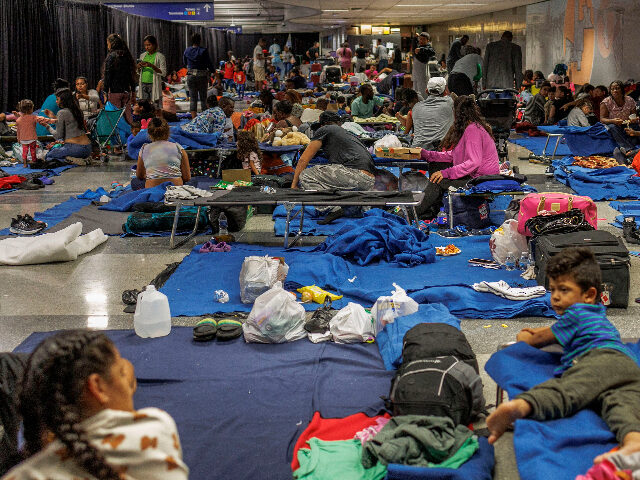Hispanic residents of Chicago’s Pilsen neighborhood gathered at a town hall meeting Tuesday to protest the opening of a new shelter for illegal immigrants.
During the October 3 meeting, residents blasted city officials for raising property taxes while offering free housing, healthcare, and meals to illegals and even fast-tracking work permits for border crossers, as Hispanics who have been in America for years have had to struggle on their own, the Chicago Tribune reported.
The meeting was called after city officials quietly opened a new shelter in an empty warehouse near Cermak Road and Halsted Street. The shelter was opened without notice and without any debate or local input.
While some of the 150 residents in attendance support migrant shelters as a general idea, many feel that it is unfair for thousands of illegals who have recently flooded over the border during President Joe Biden’s border crisis to be the beneficiaries of untold millions in government support when illegals who have been here for decades have been forced to make it on their own with no such aid.
Residents expressed that they feel shortchanged, as the taxes they have paid into the city’s coffers are going to newcomers, whom many at the meeting felt are uninterested in finding jobs because the city gives them everything for free.
Chicago has seen more than 15,000 illegal border crossers dropped off from buses sent from several border states, and that number is climbing by the week.
WATCH: Immigrants Make Camp, Scatter Belongings and Trash in Police Stations Around Chicago
Rebecca Brannon, Independent Photojournalist/LOCAL NEWS X /TMX
Chicago resident Esmerelda Cargoca expressed a sentiment typical of many of the attendees at the meeting.
Cargoca, 48, said when her family arrived in the U.S., help was not available. But eventually, she was able to open up a small store and make her way. However, when Chicago shut down businesses during the hysteria over the COVID-19 virus, she lost her store. Once again, there was no help from the government, even when she asked for it.
“I lost my store during the pandemic, and even after I asked for help, I couldn’t get it, so I ask: Where is that help for people like myself?” she asked to applause.
Cargoca added that all the government freebies — food, shelter, clothing, health care — discourage the new arrivals from looking for work.
Romulo Peralta, who lives in nearby Jefferson Park, agreed. The freebies make matters worse.
“People are afraid to say what they really feel because we are paying for all of this, and many refuse to go out and just find a job,” he said in Spanish during the meeting.
While speaking up for the shelters, Pilsen resident Rev. Emma Lozano also acknowledged the basic unfairness of the current crisis.
“Eleven million have been living here for decades without work permits,” Lozano said. “We’re your neighbors; we’ve been here forever, and we don’t have those workers’ permits.”
Town hall meetings like this have sprung up all across Chicago neighborhoods where Democrat Mayor Brandon Johnson has opened new shelters. The meetings are universally contentious, with fierce opposition to the shelters.
The recently elected “progressive” mayor has taken heavy criticism for stashing illegals in parks, closed school buildings, and university campus buildings.
Johnson took criticism for his migrant shelter in Wilbur Wright College on the Northwest Side that he opened even though citizens gathered in May to protest the plan. He was also blasted for designating Chicago’s Daley College as a shelter where he stashed another 400 border crossers. Another meeting was held at the end of August to protest Johnson’s move to house hundreds of illegals in the Hyde Park neighborhood.
The quickly spiraling crisis of sheltering tens of thousands of illegals was also addressed by Illinois’ far-left Gov. J.B. Pritzker, who, in separate remarks, warned President Joe Biden that the crisis is putting an “enormous strain” on Illinois.
In a letter to Biden, Pritzker called the border crisis an “enormous strain on our state resources” but stopped short of demanding that the border be shut down.
Pritzker asked Biden and Department of Homeland Security (DHS) Secretary Alejandro Mayorkas “to take swift action and intervene on our behalf and on behalf of the other affected states and their residents” by fast-tracking work permits for the newly arrived border crossers.
“We ask that the White House and the Administration continue to look for ways to ‘cut the red tape’ and speed up the work authorization process by all means necessary,” Pritzker wrote.
Follow Warner Todd Huston on Facebook at: facebook.com/Warner.Todd.Huston, or Truth Social @WarnerToddHuston

COMMENTS
Please let us know if you're having issues with commenting.